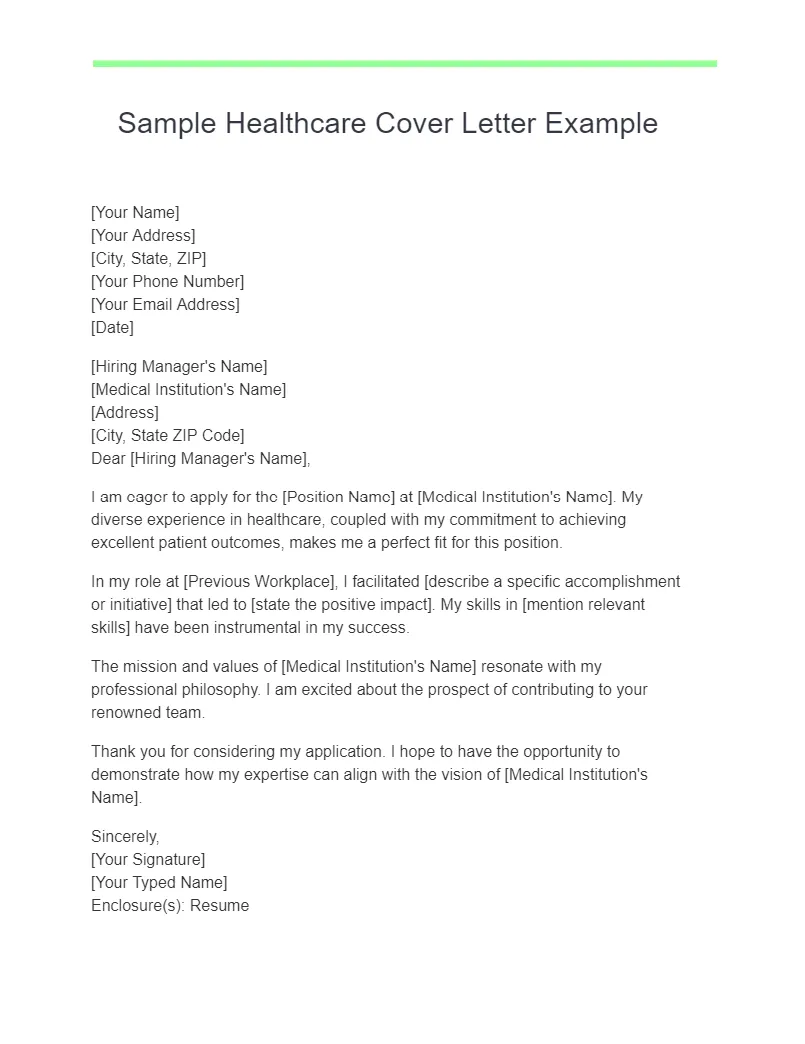Healthcare Management Cover Letter Guide (Top 5 Examples)
Navigating the healthcare industry requires more than just skills it demands a strategic approach to job applications. Your cover letter is your initial point of contact a crucial tool to demonstrate your understanding of healthcare management and your ability to contribute to an organization’s success. This guide provides insights and practical examples to help you craft compelling cover letters that will get you noticed. We’ll explore why a well-written cover letter is essential, highlight key skills to showcase, and provide five diverse examples to illustrate different career stages and roles. The healthcare sector is constantly evolving, demanding professionals who can adapt, innovate, and lead. Your cover letter should reflect these qualities.
Why Healthcare Management Cover Letters are Important
In the competitive field of healthcare management, a cover letter is your opportunity to go beyond the resume and showcase your personality, passion, and relevant experience. It allows you to tell a story about why you are the ideal candidate for the specific position. A well-crafted cover letter can differentiate you from other applicants, demonstrating your communication skills and your understanding of the healthcare organization’s needs. It’s a chance to highlight achievements and tailor your qualifications to match the job requirements, making a strong first impression and increasing your chances of securing an interview. Healthcare management is a people-oriented field, and the cover letter provides a glimpse into how you interact and communicate.
Understanding the Purpose of a Cover Letter
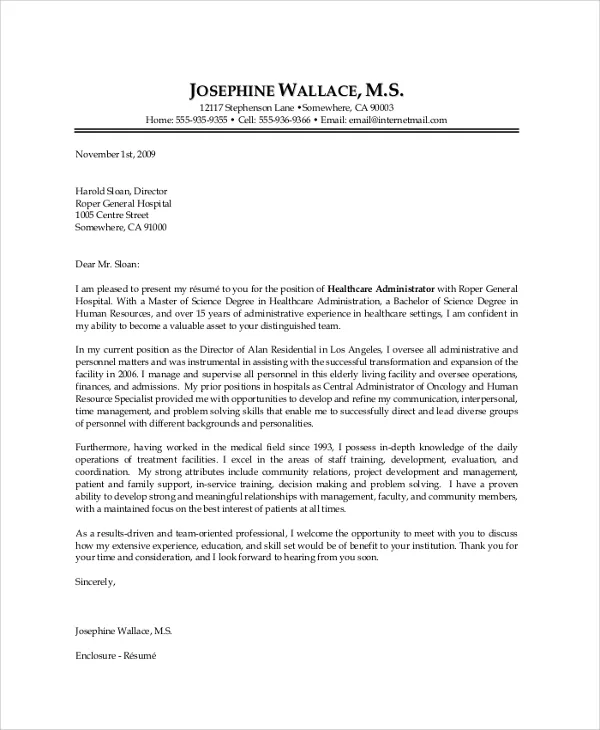
The primary goal of a cover letter is to introduce yourself and express your interest in a specific role within a healthcare organization. However, its purpose extends far beyond a simple introduction. A cover letter must persuade the hiring manager to review your resume by highlighting your most relevant skills and experiences. It should demonstrate your understanding of the organization’s mission and values and explain how your qualifications align with their needs. The cover letter serves as a bridge connecting your past experiences to the future role, showcasing your potential to contribute to the organization’s success. It should be concise, compelling, and tailored to each job application, making a strong case for your candidacy.
Highlighting Key Skills for Healthcare Management
Healthcare management demands a diverse skill set, ranging from leadership and communication to technical expertise and financial acumen. Your cover letter should spotlight those skills most relevant to the target position. Focus on abilities that illustrate your capability to improve operational efficiency, manage budgets, lead teams, and enhance patient care. The ability to communicate clearly and concisely is paramount, as is the capacity to problem-solve and make informed decisions. Emphasize your understanding of healthcare regulations, compliance, and the challenges facing the industry. Showcasing these key skills helps you stand out and positions you as a well-rounded candidate.
Skills to Showcase in Your Cover Letter
When writing your cover letter, emphasize your key skills, tailoring them to the job description. Focus on leadership, highlighting instances where you’ve managed teams or led projects successfully. Communication skills are vital; demonstrate your ability to convey complex information clearly and effectively, both in writing and verbally. Highlight any technical skills, such as proficiency in healthcare software, data analysis, or project management tools. Financial skills, including budgeting, cost analysis, and revenue cycle management, are highly valued. If you have specific certifications, such as PMP or Six Sigma, mention them to show your dedication and expertise. Soft skills, such as adaptability and problem-solving, are also important to include.
Leadership Abilities and Experience
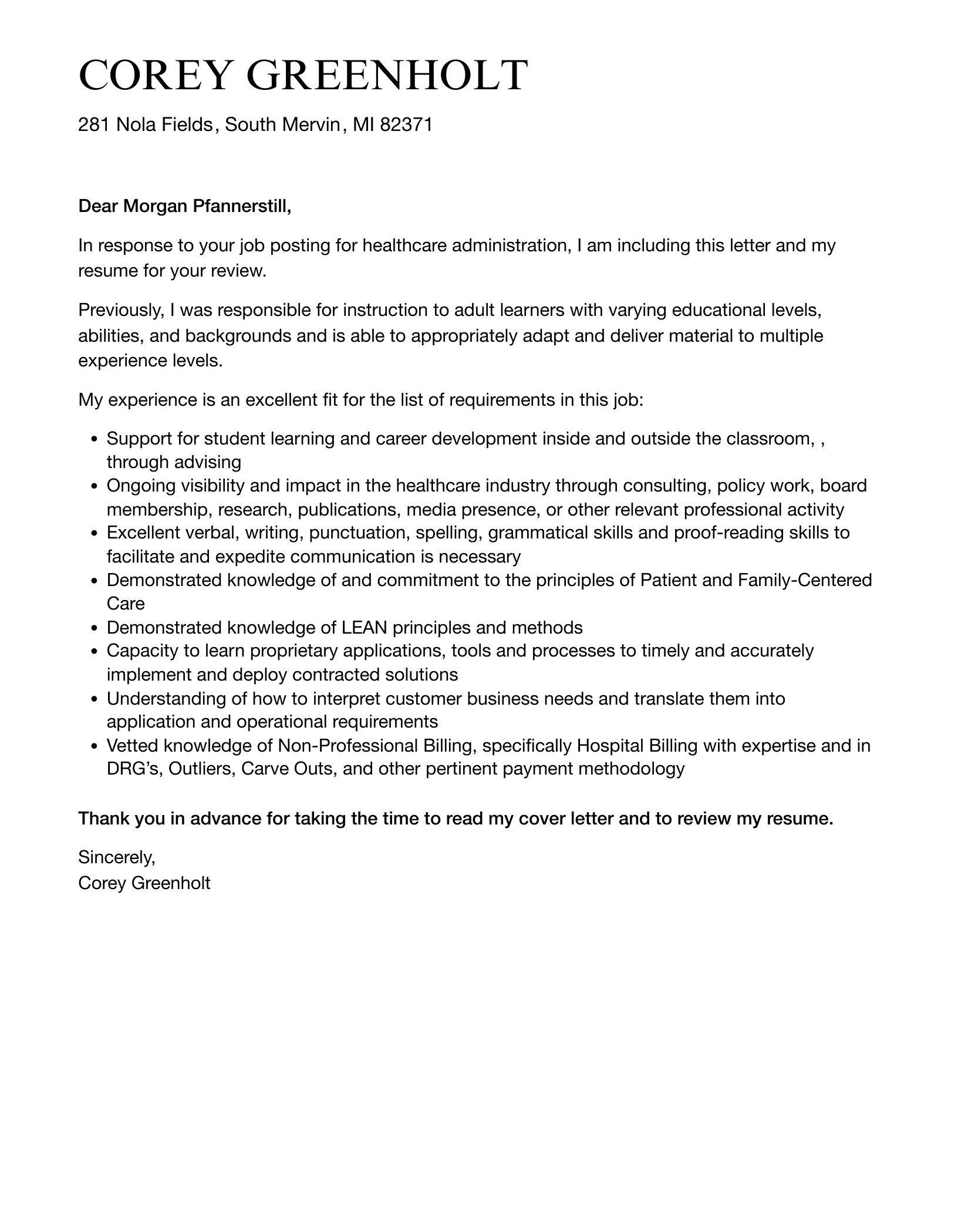
Leadership is a cornerstone of effective healthcare management. In your cover letter, showcase your ability to lead and motivate teams, guide projects, and implement strategic initiatives. Provide examples of how you’ve successfully managed projects, improved team performance, or led organizational change. Describe specific instances where you have demonstrated leadership skills. Highlight your experience in setting goals, delegating tasks, and providing constructive feedback. Mention any training or certifications in leadership or management that you have completed. Emphasize your ability to create a positive work environment and your commitment to fostering a culture of collaboration and excellence within healthcare settings.
Communication and Interpersonal Skills
Effective communication is essential in healthcare. Showcase your ability to communicate clearly, concisely, and empathetically with diverse stakeholders, including patients, medical staff, and administrators. Provide examples of how you’ve resolved conflicts, mediated disputes, or facilitated communication between departments. Emphasize your ability to build strong working relationships and collaborate effectively. Showcasing your interpersonal skills enhances your qualifications and demonstrates your ability to work effectively within healthcare environments. Discuss your experience with public speaking, presentations, or any training you’ve received in communication strategies.
Technical Skills and Knowledge
Healthcare management often requires familiarity with specific software, data analysis tools, and regulatory compliance. Mention any technical skills or knowledge that aligns with the job requirements. This could include experience with electronic health records (EHR) systems, data analytics software (e.g., SQL, Tableau), or project management tools (e.g., Microsoft Project). Demonstrate your understanding of healthcare regulations, such as HIPAA, and your ability to ensure compliance. Highlight any certifications or training you have in areas like data security, healthcare informatics, or project management. This information shows your specific expertise and your ability to perform essential job functions.
Top 5 Healthcare Management Cover Letter Examples
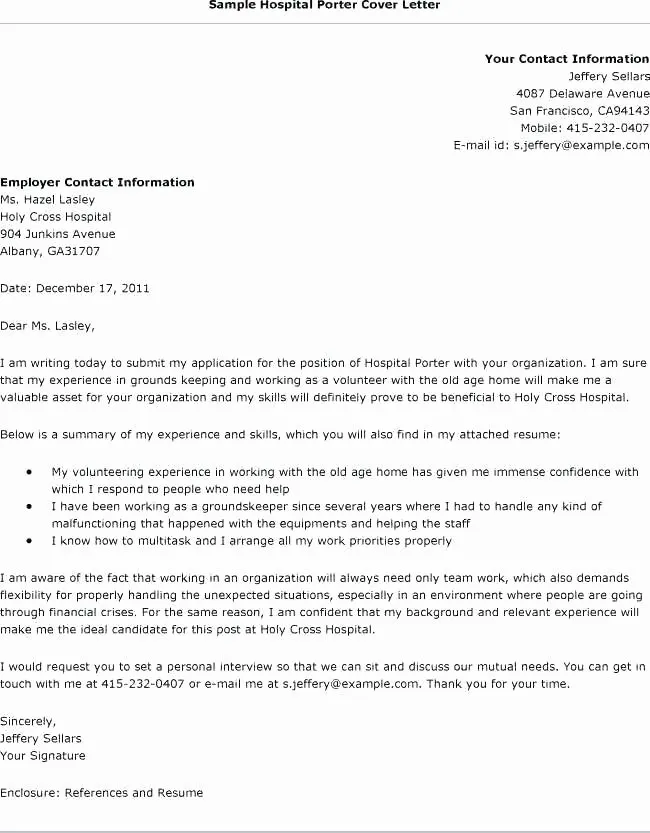
Below are five examples tailored for different healthcare management roles, providing insights into how to highlight relevant skills and experiences. These examples can be used as a reference when writing your own cover letter, helping you craft a document that highlights your qualifications and aligns with the expectations of various healthcare positions. These examples aim to provide you with a starting point. Remember to tailor each example to the specific job description and your individual experiences.
Example 1: Entry-Level Healthcare Management
This example is suitable for those with limited experience in healthcare management, such as recent graduates or individuals transitioning from other fields. It focuses on education, relevant coursework, internships, and any transferable skills. Highlight any volunteer experience in healthcare and emphasize your enthusiasm for the field. The goal is to demonstrate your potential, eagerness to learn, and foundational understanding of healthcare principles. Focus on skills like communication, organization, and problem-solving. Show your willingness to develop expertise in healthcare management through training or further education.
Key Sections and Content
The key sections should include a strong opening, highlighting your career aspirations. Summarize your educational background and how it prepares you for a career in healthcare management. Include any relevant skills such as data analysis or project management. Showcase any volunteer or internship experience. Mention your familiarity with healthcare regulations and demonstrate your commitment to patient care. Show your willingness to learn and contribute to the organization. Close with a statement of eagerness for an interview.
Example 2: Experienced Healthcare Administrator
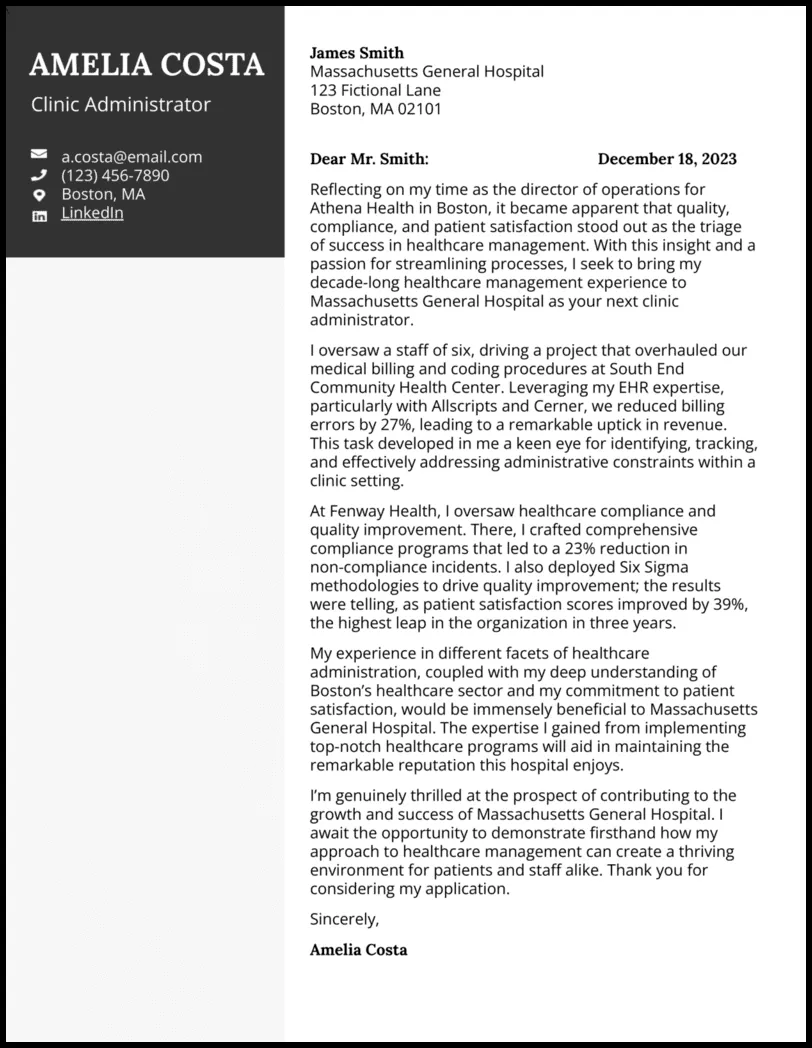
This example is designed for seasoned professionals with years of experience in healthcare administration. It should highlight your significant achievements, leadership roles, and financial management experience. Emphasize your success in improving operational efficiency, reducing costs, and enhancing patient satisfaction. Focus on outcomes and quantifiable results that demonstrate your impact on past employers. Mention any specific initiatives you have led, as well as your skills in strategic planning, budget management, and risk assessment. Show your proven track record and your value to the organization.
Key Sections and Content
Start with a compelling summary that highlights your key accomplishments and your vision for the role. Showcase your successful projects that have improved patient care. Highlight your leadership roles and experience. Emphasize financial management skills and mention any positive impacts on revenue or cost reduction. Mention any specific training or certifications, and provide data-driven examples of your successes. Close by expressing your enthusiasm for joining the healthcare organization.
Example 3: Healthcare Project Manager
This example should highlight your project management skills. Mention your experience in managing healthcare projects. Highlight your use of project management methodologies. Emphasize your ability to lead teams, manage budgets, and ensure projects are completed on time and within scope. Showcase your knowledge of project management software. Highlight your understanding of healthcare regulatory compliance. Mention any project management certifications such as PMP or PRINCE2. Focus on successful project outcomes and how you have contributed to the strategic goals of your projects.
Key Sections and Content
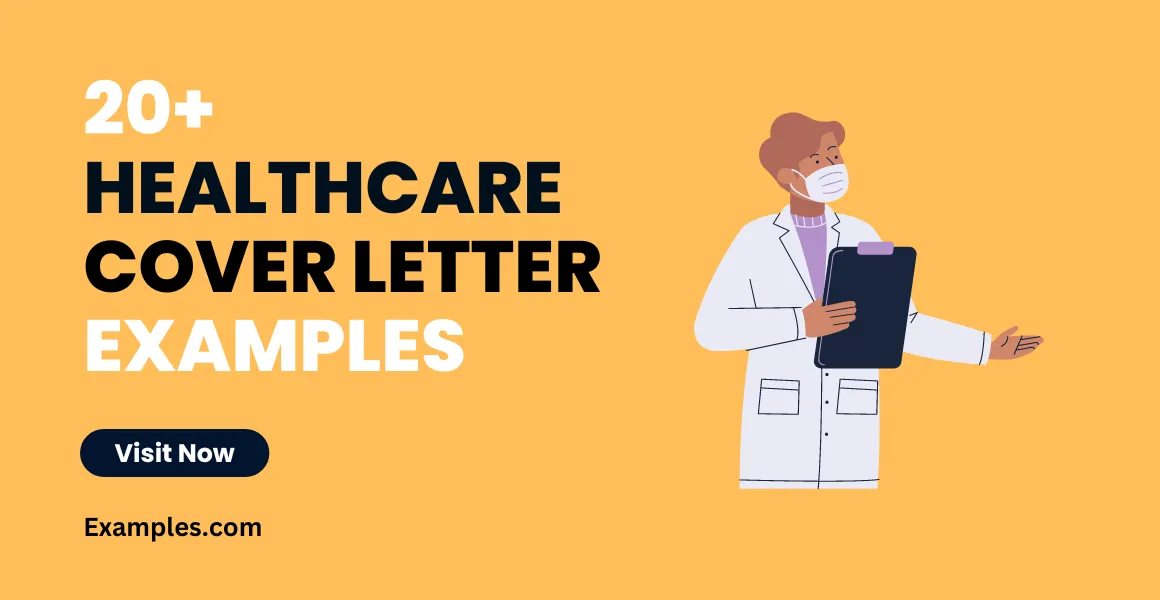
Start with a summary of your experience and highlight your skills. Describe your experience in managing healthcare projects. Provide examples of successful projects that have improved patient care. Emphasize your ability to lead teams, manage budgets, and ensure projects are completed on time and within scope. Showcase your knowledge of project management software and healthcare regulatory compliance. Provide specific examples of your accomplishments in previous roles and the results you have delivered.
Example 4: Healthcare Consultant
This cover letter should demonstrate your expertise in healthcare consulting. Mention your ability to analyze healthcare systems and recommend improvements. Highlight your experience in consulting for various healthcare organizations. Emphasize your ability to identify problems, develop solutions, and implement strategies that enhance efficiency, reduce costs, and improve patient outcomes. Mention your specific area of expertise, such as financial management, clinical operations, or IT systems. Highlight any experience you have with change management or strategic planning. Focus on how your skills and expertise have delivered positive impacts in previous consulting roles.
Key Sections and Content
Begin with a summary of your consulting experience, highlighting your expertise and your understanding of the healthcare industry. Provide specific examples of successful consulting projects and the positive impacts you have made. Discuss your analytical skills, your ability to identify problems, and your recommendations. Mention your experience with change management or strategic planning. Close by expressing your confidence in contributing to the client’s goals.
Example 5: Healthcare Financial Analyst
This example should focus on your financial and analytical skills. Demonstrate your proficiency in financial modeling, budgeting, forecasting, and cost analysis. Emphasize your experience in managing healthcare finances. Highlight your ability to analyze financial data, identify trends, and make data-driven recommendations. Showcase your knowledge of healthcare regulations, compliance, and reimbursement models. Mention your experience with financial software and reporting tools. Focus on your ability to improve financial performance and reduce costs. Highlight your experience with financial planning, and your ability to support strategic decision-making.
Key Sections and Content
Start with a summary highlighting your financial expertise and your understanding of the healthcare industry. Provide examples of how you have successfully managed healthcare finances. Discuss your experience with financial modeling, budgeting, forecasting, and cost analysis. Mention your knowledge of healthcare regulations, compliance, and reimbursement models. Close by expressing your enthusiasm for contributing to the healthcare organization’s financial goals.
Tips for Writing a Strong Cover Letter
To maximize the impact of your healthcare management cover letter, consider these key tips. Tailor your letter to each job application. Proofread carefully to eliminate errors. Maintain a professional tone and format, highlighting your value and expressing your genuine interest in the role. Follow the specific guidelines for each job application, and customize your cover letter to resonate with the hiring manager. Always proofread your letter to catch any grammatical errors. The cover letter should always be carefully tailored to the specific job and healthcare organization, showcasing your knowledge of the organization’s needs and your ability to contribute to its success.
Tailoring Your Cover Letter to Each Job
Customizing your cover letter for each job is crucial for demonstrating your genuine interest and understanding of the specific role and organization. Review the job description carefully, identifying the key skills and qualifications the employer is seeking. Use the job description to inform the content of your cover letter, including relevant keywords and phrases. Highlight the experiences and skills. Focus on the key aspects of the role. Research the healthcare organization to understand its mission, values, and current challenges. Address the hiring manager by name when possible, and tailor your tone to match the organization’s culture. This attention to detail can significantly increase your chances of getting noticed. The more you tailor your letter, the better the impression.
Proofreading and Editing Your Cover Letter
Proofreading is an essential step in cover letter writing, as it ensures your letter is polished and professional. Before submitting your application, carefully review your cover letter for any grammatical errors, typos, and inconsistencies. Read your letter aloud to catch any awkward phrasing. Ask a friend or colleague to review your cover letter to provide a fresh perspective and identify any potential errors. Ensure the formatting is consistent throughout the document, and that the font and layout are easy to read. Proofreading is key to making a good impression. Small errors can create a bad impression, so attention to detail is critical.
Formatting Your Cover Letter for Readability
Formatting plays a crucial role in making your cover letter easy to read and visually appealing. Use a professional font, such as Times New Roman or Arial, in a readable size (11 or 12 points). Ensure the cover letter is single-spaced with one-inch margins on all sides. Use clear headings and subheadings to break up the text and make it easier for the reader to scan the document. Maintain a consistent style throughout the cover letter, and use bullet points to highlight key skills and achievements. Keep the paragraphs concise and to the point. A well-formatted cover letter demonstrates your attention to detail, which is a valuable skill in healthcare management. A good format will make your letter look professional.
